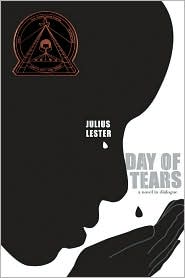http://www.glynngen.com/slaverec/butler.htmThis site actually lists out the names and prices of the slaves sold in the Butler auction. It has other notes that the author of the site found during research. It's actually a really cool website, so check it out!
The Butler auction is often referred to as "the weeping time," which explains why the book was given its' title.
http://www.pbs.org/wgbh/aia/part4/4p2918.html"It is a dreadful affair, however, selling these hereditary Negroes. . . . Families will not be separated, that is to say, husbands and wives, parents and young children. But brothers and sisters of mature age, parents and children of mature age, all other relations and the ties of home and long association will be violently severed. It will be a hard thing for Butler to witness and it is a monstrous thing to do. Yet it is done every day in the South. It is one among the many frightful consequences of slavery and contradicts our civilization, our Christianity, or Republicanism. Can such a system endure, is it consistent with humanity, with moral progress? These are difficult questions, and still more difficult is it to say, what can be done? The Negroes of the South must be slaves or the South will be Africanized. Slavery is better for them and for us than such a result."
-Philadelphia socialite Sidney George Fisher regarding the Butler auction
http://www.savannahga.gov/cityweb/rlibcat.nsf/f0bad60b4a15a12785256b1b006ac5ad/3e173fa8463ec3f6852572ec00412ebd?OpenDocumentThis website is from the city of Savannah, GA. It discusses the different laws and the timeline regarding slavery in Savannah.
Other books:
Saving SavannahSavannah Tempest: the Hidden Savannah

